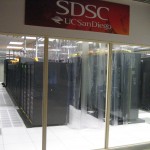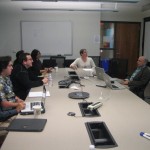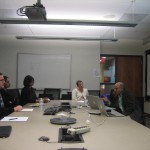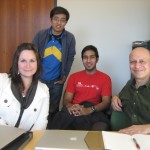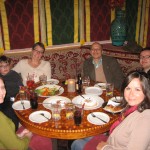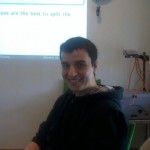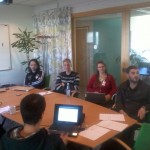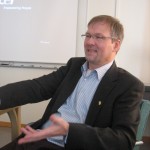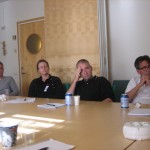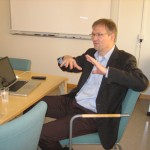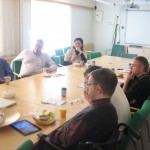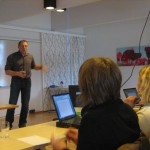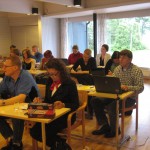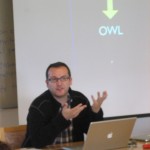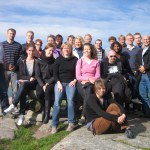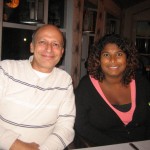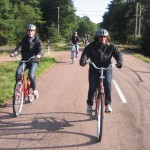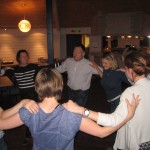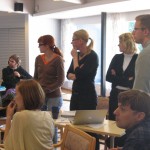I visited associate professor Wendy Chapman and her research group at iDash at the Division for Biomedical Informatics, UC San Diego, Supercomputing Center in La Jolla, as part of the Interlock collaboration. We discussed the possibility of sharing and releasing clinical textual data for research. One concrete problem discussed with Dr. Lucila Ohno-Machado (Founding Chief) is that the physical storage of data outside of a country boarders might not be acceptable for each countries’ Ethical committee. One solution to this could be to store the data in each country and then share the data. Next stop was at ISI/University of Southern California in Marina Del Rey, Los Angeles. I presented some of the research carried out of by our research group IT for Health and specifically how one can use clinical text mining to construct tools that physicians, nurses, clinical researchers and hospital management can make use of to improve the health care processes.
Global Forum 2011 Shaping the future, Bryssel
Global Forum 2011 Shaping the future, är en konferens som har pågått i 20 år i Europa och i USA, första gången i Washington DC 1992 och nu i Bryssel. Det är en sorts think-thank, tankesmedja inom ICT med mestadels företagsledare, investerare, politiker, jurister, lobbyister, forskare. Här i Bryssel är det cirka 300 deltagare. Könsfördelningen är 80% män och 20% kvinnor, nu på dag två lite jämnare balans. Det diskuteras om IT-säkerhet, E-government, E-hälsa, M-hälsa, riskhantering, IT-strategier, globalisering, Cloud computing mm. Vi sitter i stor oval där alla kan se alla och kan kommentera i en mikrofon på varje sittplats. Det är en intressant variant av konferens. Man diskuterar och siar om framtiden inom ICT och affärer.
Nästa Global Forum 2012, Shaping the future kommer att ske i Stockholm i 12-13 November 2012. Stora företag inom IT och revision sponsrar konferensen. Jag ingick i panelen om Citizens Centered e-Health & mHeath
Blogg, http://www.globalforumblog.com
/Hercules
SSF-research proposal accepted = 19 MSEK!!
The research proposal with the title High-Performance Data Mining for Drug Effect Detection to SSF were accepted encompassing 19 MSEK and 5 years. Project leader is professor Henrik Boström at DSV. One part of the project concerns text mining of clinical texts that the research group within IT for Health will carry out, for details about the project click here, in Swedish and in English.
/Hercules
Three accepted project proposals to Vinnova’s call Utmaningsdriven innovation
Researchers at the Information systems unit submitted six research proposals to Vinnova’s “Utmaningsdriven innnovation” and got three project proposals accepted. This is a 50 percent acceptance rate, the average acceptance rate was 16 percent on this call.
The accepted projects were:
Öppna sociala molntjänster (Open Social Cloud Services) by Gustaf Juell-Skielse and Petia Wohed.
Individanpassad paketering av IT-baserade hälso- och sjukvårdstjänster (Citizen Centric Packaging of eHealth Solutions) by prof. Anne Persson at University of Skövde with Paul Johannesson and Janis Stirna as co-applicants. Both projects are within the application area IT for Health.
Within Human Language Technology we got:
Automatiserat ärendestöd med språkintelligens (Increasing automation of request management for public authorities by language technology) by Eriks Sneiders and co-applicants Tessy Cerratto-Pargman and Ola Knutsson
Congratulations!
/Hercules
IT for Health Seminar – Miguel Ballesteros: Enhancing and Applying Dependency Analysis in Different Topics: Negation, Speculation and Text Simplification
Today we had an invited guest Miguel Ballesteros, from the Department of Software Engineering and Artificial Intelligence at Universidad de Complutense, Madrid, that is visiting the Department of Linguistics and Philology, Uppsala University for a research stay this fall.
Miguel talked about dependency parsing of clinical and biomedical scientific text to infer the scope of negation and speculation by traversing dependency structures, Miguel presented also a method of pruning the dependency tree to obain text simplification or with other word text summarisation.
IS-seminarie Experience reuse … the missing link? : Peter Funk
Peter Funk professor at Mälardalens högskola, Västerås, visited us today and held an IS-seminar. Peter is a former student at DSV, that worked at Ellemtel, Ericsson, and took his PhD at Edinburgh University in Scotland in Artificial Intelligence.
Peter talked about his different projects at Mälardalens högskola that is tight connected to Robotdalen, that is manufacturing industry in Västerås and Eskilstuna, with ABB, Bombardier and Volvo using lots of robots to manufactor products. Peter desrcribed different smart sensors that can reveal just by the sound if something will go wrong or is wrong. Further on Peter described some medical applications in stress management and but also reusing different patient cases in the treatment.
Fifth HEXAnord meeting Åland September 21-23, 2011
We carried out the fifth HEXAnord meeting in Åland September 21-23, 2011. We were 22 participants from Scandinavia, USA and UK. The theme of this meeting was “Pragmatics of using, representing and accessing clinical text and information” and was organized by Øystein Nytrø, from NTNU, Trondheim, Norway but the lectures were the senior particiapants. The theme was also part of the PhD-training course with 12 PhD students from the network. Special invited guests were Rebecka Janols from Uppsala University and Mike Conway from University of California, San Diego. Mikes trip to Scandinavia were carried out within the framework of the Interlock project. Except of working we also did both sauna and sea bathing, a bicycle excursion and danced on the beautiful island of Åland.
IS-Seminar: Making Natural Language Processing (NLP) More Accessible for Analysis of Clinical Text: Wendy Chapman
Welcome to our next IS-seminar:
Making Natural Language Processing (NLP) More Accessible for Analysis of Clinical Text with Dr. Wendy Chapman from University of California, San Diego.
When: Wednesday June 8th 12.00-13.00
Where: 6405A Forum 100 DSV/Stockholm University, Kista
Abstract
In spite of decades of research in NLP, applications for clinical text have not yet had muchof an impact. Researchers in clinical NLP are working towards making NLP more accessible through common data models, shared datasets, and web services. I will illustrate NLP’spotential application to clinical text with two applications we have developed, will describe initiatives leading to more collaborative development, and will summarize the vision for an NLP ecosystem that was shaped during a recent UCSD workshop. The goal of the ecosystem is toprovide an environment for easier development, application, and benchmarking of clinical NLP tools.
Wendy Chapman’s Bio
After studying linguistics, Dr. Wendy Chapman received her Ph.D in Medical Informatics at theUniversity of Utah with a research focus of natural language processing (NLP). After ten years at the University of Pittsburgh, Dr. Chapman joined UCSD. Her work has mainly addressed extraction of information from clinical reports, including identifying evidence of acute bacterial pneumonia from chestradiography reports and evidence of conditions relevant to detecting disease outbreaks from emergency department reports. She leads the American Medical Informatics Association NLP Working Group and several efforts to develop a collaborative infrastructure for developmentand application of NLP.
